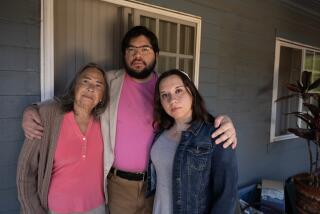A Call for Repotting : Group Wants Flower Market to Leave L.A.
The head of an association of 1,500 retail and wholesale florists in Southern California has proposed moving the Los Angeles flower market out of the city.
Michael A. Bradley, the executive vice president of the Southern California Floral Assn., said he would like to see the development of a new flower market modeled after the large, enclosed European facilities that he has toured and that he praises as “showplaces.”
Such a flower mart, Bradley said, would better serve the retail florists who depend on the market’s selection of blooms and could become a major Southland tourist attraction.
The flower market’s current Wall Street location near Skid Row, he said, is plagued with traffic and parking problems and a growing number of homeless--a situation that he said is driving away the retail florists who shop there and are the primary source of the district’s $100 million in annual sales.
Possible sites for a new flower mart are in the City of Commerce and the City of Industry, Bradley said. Officials in those cities say they have not been contacted by Bradley but added that they have facilities available to accommodate the huge operation, the second largest in the world after the Dutch market in Aalsmeer.
Bradley’s association represents more than 1,500 retail and wholesale florists throughout Southern California. It also serves as a link between the two competitive wholesale markets in the district--the Los Angeles Flower Market and the Los Angeles Wholesale Flower Terminal of Southern California Growers Inc.
The two markets are located on opposite sides of Wall Street between 7th and 8th streets.
Along with the general managers of both markets, Bradley has started what he described as “the opening phases of looking at a five-year plan of what we are doing with our market.”
If the 55-year-old flower market is to stay where it is, Bradley said, “we have to make it more convenient for our florists. My main concern is I’m not sure we’re offering retail florists the easiest access.”
The general manager of the Los Angeles Flower Market, John Mellano, said the current location prevents further growth.
“We’ve got a derelict in front of the restaurant (Gorky’s at 8th Street and San Julian Place) urinating in front of the customers--that’s a problem. You call the cops and they say they can’t do anything--that’s a problem,” he said.
The Police Department’s inability to remove the homeless from the market area has been particularly frustrating, Bradley said.
Police officials said they are puzzled by the complaints.
“I’m somewhat surprised. I don’t see what they are complaining about,” said Central Officer Don Cox, adding that there are fewer transients around the flower market than other downtown business districts.
However, former market customers have said that the homeless situation and crime in the area have been factors that have forced retail florists to rely on a growing number of wholesale delivery services and the increasing number of wholesale ‘satellites’--small local floral outlets affiliated with wholesalers based in the flower district.
The owner of Amelia’s Flowers in Bellflower, Amy Cunningham, said that before her car window was smashed and her purse and duffel bag stolen in January, she would travel to the market two or three times a week.
“I’ve been there five times since,” she said, explaining that she now relies on the wholesalers’ delivery services.
Bradley and Mellano said the Los Angeles Flower Market’s nine-member board of directors supports the floral association’s move to study plans for relocation.
“There have been two meetings with a developer talking about relocating the market,” Mellano said.
One of the developers that met with Mellano and Wholesale Flower Terminal General Manager Dan Torii recently was Orange County’s Birtcher Corp., Torii said. Birtcher, a commercial and industrial developer, redesigned the Los Angeles produce market in the early 1980s.
Business in the market is not going down, according to several wholesalers. They attribute the growth of satellite wholesale outlets in Southern California to retail florists’ demands for convenience, not their dissatisfaction with the Los Angeles flower district. There is no problem, they say, that needs to be solved by moving the market.
“I’ve been in the market 18 years,” said Jim Young, owner of Quality Wholesale Florist in the Los Angeles Flower Market. “I’m happy here. I’d rather stay here.”
But Young and his fellow tenants have little decision-making power in the Los Angeles Flower Market--a situation that is quite different from the Los Angeles Wholesale Flower Terminal of Southern California Growers Inc., which is owned by its tenants--mainly Japanese-American businessmen whose shops go back decades to the mart’s founding.
One of the largest of these tenants, Mas Yoshida, the owner of G.M. Floral Co., said emphatically: “We are here to stay. There is always talk of moving to a better area, but there is always going to be problems.”
Yoshida was also one of numerous wholesalers interviewed who said they were surprised to hear that Bradley has met with developers--a matter that Bradley explained was due to the preliminary nature of the meetings.
Wholesalers on both sides of the street say the flower market’s downtown location has a hold on them because in many cases it is where their parents first started buying and selling flowers. For the Japanese-American wholesalers, who in most cases also are the growers of their flowers, the district has special meaning because of its founder, Frank Kuwahara, a member of the Community Redevelopment Agency and large Wholesale Flower Terminal shareholder.
Disagreement About Moving
The 75-year-old Kuwahara, who started the market with his family in 1923, said the merchants in the terminal are perhaps too comfortable with their surroundings.
“They don’t have a vision of what is going to happen in the future,” he said, but called plans to move the market “just talk.”
More to Read
Inside the business of entertainment
The Wide Shot brings you news, analysis and insights on everything from streaming wars to production — and what it all means for the future.
You may occasionally receive promotional content from the Los Angeles Times.










